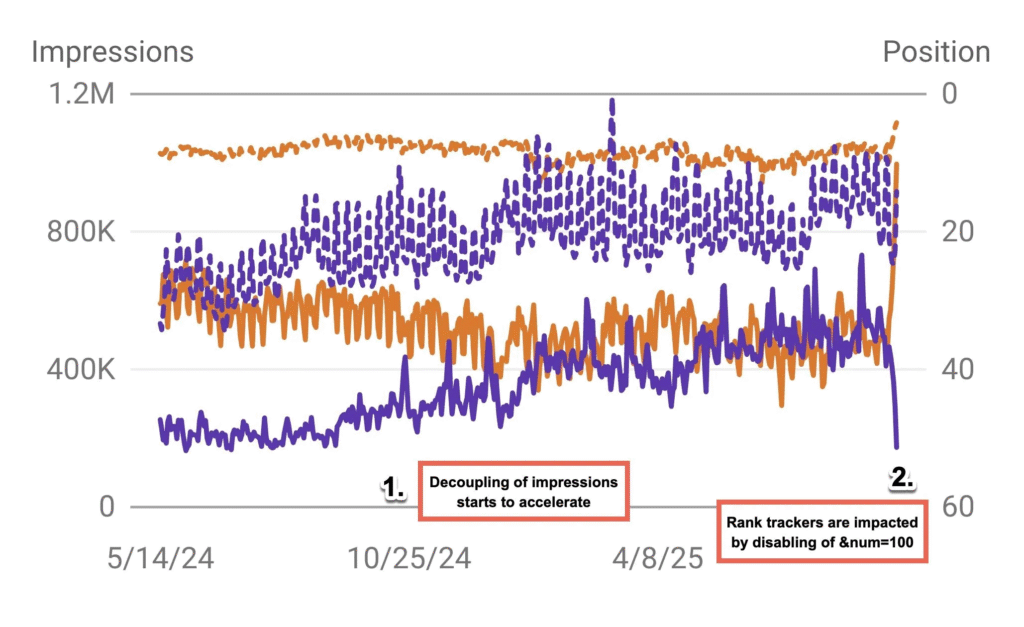Google Search has always been the place people go to find answers, products, and businesses However, if you’ve searched recently, you might have noticed it doesn’t feel the same.
Many people are saying it’s harder than ever to find the organic results, and forums as well as X.com posts are full of frustration about what Google has become.
In many searches, we have found several ads appearing before each organic result, making it difficult to reach the actual listings.
The two most visible changes are the overwhelming number of ads positioned around organic results and the shift from multiple pages of results to one continuous scroll. Both adjustments are reshaping how people use search and how businesses must approach visibility.
A Growing Wall of Ads
The biggest change people complain about is how much ad space takes over the results. Not long ago, ads were neatly boxed off at the top or bottom of the page. Now:
- Ads appear in a block at the very top, often three or four deep
- Shopping ads and product listings blend in with results, looking almost organic
- More ad placements show up again halfway down or at the very bottom
- AI summaries and answer boxes push organic links below the fold

On Reddit, one user summed it up bluntly:
“When Google said “Search results tailored for you”, I didn’t think they meant ads, ads, and more ads.”
@serpalerts on X.com are even sharper in tone:
“Following the changes for disabling &num=100, there is now various reports of Google increasing the amount of ads on page 1 of their search results, slotting in many ads between all organic listings.”
The perception is clear, ads are no longer just “around” search, they are ruining the experience.
Where Did All the Other Pages Go?
The other major observation is how Google has essentially eliminated the traditional 10 pages of results. Instead of clicking “next page,” users now get a single, continuous scroll of page one..
At first glance, this seems convenient. But the side effect is that almost no one scrolls far enough to reach results beyond the first batch. Page two used to get some traffic; now it’s practically invisible
As one frustrated Redditor put it:
“Yes, I see the same. It’s a frustrating experience to search for anything these days. I feel like I have to swim in a pile of garbage before I get to something decent, and then I don’t even have anything to compare that something decent with, because the rest is ads and AI crap.”
This shift has narrowed the funnel of visibility. Websites that used to survive on page two or three are now gone from user reach.
For businesses, this raises the stakes even higher. You’re either on top of page one or you may not be found at all.
The Bigger Impact on Businesses

These changes are not just cosmetic. They carry direct consequences for how businesses get found online. Forum and X.com discussions point to several key effects:
- Organic traffic is dropping. Even strong rankings don’t deliver the same clicks because ads and AI answers soak up attention.
- Small businesses are squeezed. Larger brands and publishers dominate, while independents without ad budgets are losing ground.
- Pressure to spend on ads. Many businesses that relied on SEO are now forced into Google Ads just to stay visible in competitive markets.
- AI overviews complicate things. Google’s experimental summaries sometimes provide answers without sending clicks to websites at all, leaving creators with fewer visits even when their content is used.
The tone online is often critical. A Reddit user vented:
“Google manipulates your search terms, returns biased results, and more recently only ads. They’ve destroyed the internet.”
What Users Are Saying About the Search Experience?
Beyond businesses, regular users also feel the shift. Instead of finding straightforward answers, they’re faced with ads that look like results, repeated blocks of promotional content, and AI text that may or may not be accurate.
Some trends are emerging in response:
- Users add terms like “Reddit” or “forum” to their searches because they trust peer answers more than top results
- People are sharing workarounds on X.com for finding real content instead of wading through ads
- Niche communities report growing traffic because users are leaving Google to ask questions directly in forums
One popular comment captured the mood:
“Google used to be about finding information. Now it’s about selling information.”
How People Are Adapting?
Forum threads and X.com discussions also share practical advice for dealing with the changes. For businesses, the advice goes beyond “just do SEO” because the environment is tougher now. Common strategies include:
- Optimize for snippets and zero-click results. If you can appear in “People Also Ask” or a featured box, you still get visibility without fighting ads.
- Build brand loyalty. If people search directly for your name, you bypass the crowded competitive results.
- Balance SEO with ads. Paid campaigns may be unavoidable for the most competitive keywords.
- Diversify beyond Google. Social platforms, newsletters, and direct communities are becoming more valuable traffic sources.
- Use Long tail keywords that does not have advertisements like commercial ads. You may face AI overview but this is not horrible like the commercial intent short keywords.
For users, the adaptation is simpler but just as important, scroll past the ads and be mindful of what’s sponsored.
